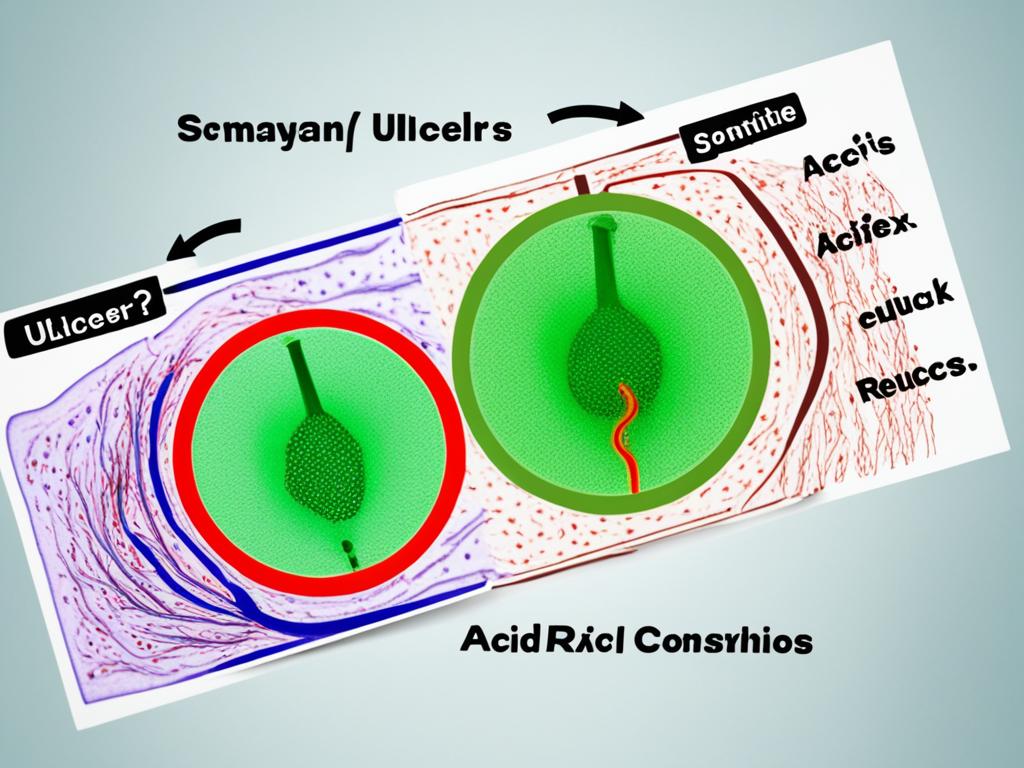Do you often get pain in your upper belly, feel sick, or suffer from heartburn? These signs are often linked to both stomach ulcers and acid reflux. But, there are important differences you should know. It’s key to understand these differences so you can get the best care and ease your symptoms.
Key Takeaways:
- GERD affects the tube that connects your mouth to your stomach. Ulcers are mostly in the stomach or intestine.
- GERD makes the lining of the tube sore, while ulcers make it get thinner.
- Feeling very full, bloated, and burping are more signs of ulcers. Heartburn and cough are main symptoms of acid reflux.
- A weak muscle in the tube can cause acid reflux. Infections like H. pylori or using certain drugs a lot can lead to ulcers.
- For both issues, treatment may mean lowering the acid in your stomach, changing how you live, and antibiotics for ulcers to kill the germ.
Symptoms of Stomach Ulcers and Acid Reflux
Feeling pain from stomach ulcers or acid reflux can disrupt your life. Knowing the symptoms of each problem is key. This helps in getting the right treatment early.
Even though stomach ulcers and acid reflux share some symptoms, they are different. It’s crucial to notice these differences.
Symptoms of Stomach Ulcers
Stomach ulcers show up in various ways. Here are common signs:
- Upper abdominal pain
- Nausea
- Decreased appetite
- Bloating
- Burping
- Feeling overfull after eating
Ulcer pain can vary, from light to severe. It might get worse at night or after eating. Extra signs could include:
- Bloody vomit
- Dark, tar-like stool
Acid Reflux Symptoms
Acid reflux happens when stomach acid moves into the throat. It often brings:
- Heartburn – a burning sensation that rises up into the chest
- Trouble swallowing
- Persistent cough
These signs can stick around and make life hard. Acid reflux might also cause a sour taste and more saliva. It’s key to tell acid reflux from other sicknesses with similar signs.
Figuring out the signs of stomach ulcers and acid reflux is super important. If you have any of these signs, see a healthcare pro. They can diagnose you and make a plan that’s just for you.
Causes and Risk Factors of Stomach Ulcers and Acid Reflux
It’s key to know the causes and risks for managing and preventing stomach ulcers and acid reflux. We’ll look into what makes these problems happen.
The Causes of Acid Reflux
A weak esophageal sphincter allows stomach content to flow back. This causes acid reflux. Some drugs like asthma meds, painkillers, and sedatives can also lead to acid reflux.
The Causes of Stomach Ulcers
H. pylori bacteria often causes stomach ulcers. You can get it from an infected person or dirty water. Using NSAIDs for a long time, like aspirin and ibuprofen, does too.
Shared Risk Factors
Stomach ulcers and acid reflux have some risks in common. Smoking and obesity can up your chances of getting either problem.
Pregnant folks might face more acid reflux due to changes in hormones and added abdominal pressure. Hiatal hernias, which push the stomach up through the chest, are another shared risk factor. They affect the development of both ulcers and reflux.
| Causes | Acid Reflux | Stomach Ulcers |
|---|---|---|
| H. pylori Infection | Yes | |
| NSAID Use | Yes | Yes |
| Smoking | Yes | Yes |
| Obesity | Yes | Yes |
| Pregnancy | Yes | |
| Hiatal Hernias | Yes | Yes |
Knowing about the causes and risks of ulcers and reflux can help us stay healthy. If you have symptoms, see a doctor for the best advice and treatment.

Managing Stomach Ulcers and Acid Reflux
Dealing with stomach ulcers and acid reflux has lots of effective strategies. Treatment often involves using medicines to lower stomach acid. These include proton pump inhibitors (PPIs) and H2 blockers.
If an ulcer is from an H. pylori infection, you may need antibiotics too. This shows how crucial it is to find the cause of the ulcer.
Lifestyle changes are big in fighting ulcers and reflux. For ulcers, stay away from NSAIDs and handle stress well. And for acid reflux, adjust your diet, keep a healthy weight, and raise your head at night.
To cut ulcer risks, keep clean and avoid too many NSAIDs. Also, eat well and make other lifestyle changes to lower ulcer and reflux chances.




